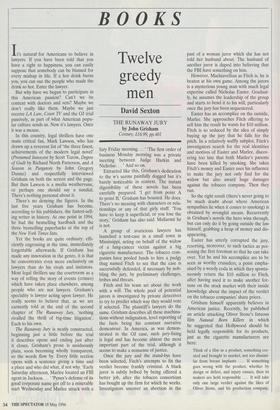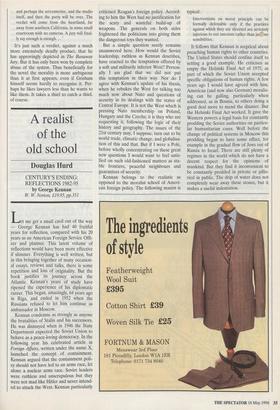BOOKS
Twelve greedy men
David Sexton
THE RUNAWAY JURY by John Grisham Century, f16.99, pp.401 It's natural• for Americans to believe in lawyers. If you have been told that you have a right to happiness, you can easily suppose that somebody can be blamed for every mishap in life. If a hot drink burns you, you can sue the people who made the drink so hot. Enter the lawyer.
But why have we begun to participate in this American passion? Can't we be content with doctors and vets? Maybe we don't really like them. Maybe we just receive LA Law, Court TV and the OJ trial passively, as part of what American popu- lar culture sends us. Now it's lawyers. Once it was a mouse.
In this country, legal thrillers have one main critical fan, Mark Lawson, who has drawn up a reverent list of 'the three finest, achievements of the modern legal novel' (Presumed Innocent by Scott Turow, Degree of Guilt by Richard North Patterson, and A Season in Purgatory by John Gregory Dunne) and respectfully interviewed Grisham on both the screen and the page. But then Lawson is a media weathervane, or perhaps one should say a sundial. There's nothing personal about it.
There's no denying the figures. In the last five years Grisham has become, according to his publishers, the fastest-sell- ing writer in history. At one point in 1994, he had the bestselling hardback and the three bestselling paperbacks at the top of the New York Times lists.
Yet the books are quite ordinary: effi- ciently engrossing at the time, immediately forgettable afterwards. If Grisham has made any innovation in the genre, it is that he concentrates even more exclusively on lawyers than do his rivals and imitators. Most legal thrillers use the courtroom as a way of telling the story of events (crimes) which have taken place elsewhere, among people who are not lawyers. Grisham's speciality is lawyer acting upon lawyer. He really seems to believe that, as we are earnestly told at the end of the second chapter of The Runaway Jury, 'nothing rivalled the thrill of big-time litigation'. Each to his own.
The Runaway Jury is neatly constructed, beginning just a little before the trial it describes opens and ending just after it closes. Grisham's prose is assiduously plain, soon becoming wholly transparent, so the words flow by. Every little section opens with a sentence giving a time and a place and who did what, if not why. 'Early Saturday afternoon, Marlee located an FBI agent in Jackson. . . "Pynex's defense of its good corporate name got off to a miserable start Wednesday and Marlee struck with a fury Friday morning. . . "The first order of business Monday morning was a private meeting between Judge Harkin and Nicholas. . . ' And so on.
Extracted like this, Grisham's dedication to the w's seems painfully dogged but it's barely noticeable in context. The instant digestibility of these novels has been carefully prepared. 'I get from point A to point B,' Grisham has boasted. He does. There's no messing with characters or rela- tionships or any of that girly stuff. 'You have to keep it superficial, or you lose the story,' Grisham has also said. Mallarme he is not.
A group of avaricious lawyers has launched a test-case in a small town in Mississippi, acting on behalf of the widow of a lung-cancer victim against a big cigarette manufacturer. The tobacco com- panies have pooled funds to hire a pudgy thug named Fitch to see that the case is successfully defended, if necessary by nob- bling the jury, by preliminary challenges, bribes and threats.
Fitch and his team set about the work with a will. The whole pool of potential jurors is investigated by private detectives to try to predict which way they would vote if selected. The plaintiffs lawyers do the same. Grisham describes all these machina- tions without indignation, level reporting of the facts being his constant narrative demeanour. In America, as was demon- strated in the OJ case, such jury-fixing is legal and has become almost the most important part of the trial, although it seems to make a nonsense of justice.
Once the jury and the stand-bys have been selected, Fitch's attempts to fix the verdict become frankly criminal. A black juror is subtly bribed by being offered a better job, after the tobacco consortium has bought up the firm for which he works. Investigators uncover an abortion in the past of a woman juror which she has not told her husband about. The husband of another juror is duped into believing that the FBI have something on him.
However, Machiavellian as Fitch is, he is beaten at his own game. Among the jurors is a mysterious young man with much legal expertise called Nicholas Easter. Gradual- ly, he assumes the leadership of the group and starts to bend it to his will, particularly once the jury has been sequestered.
Easter has an accomplice on the outside, Marlee. She approaches Fitch offering to sell him the result he wants for $10 million. Fitch is so seduced by the idea of simply buying up the jury that he falls for the pitch. In a relatively waffly subplot, Fitch's investigators search for the real identities and motives of Easter and Marlee, discov- ering too late that both Marlee's parents have been killed by smoking. She takes Fitch's money and Easter uses his influence to make the jury not only find for the widow but also award huge damages against the tobacco company. Then they run.
So the right result (there's never going to be much doubt about where American sympathies lie when it comes to smoking) is obtained by wrongful means. Recurrently in Grisham's novels the hero wins through, but can only do it by going outside the law himself, grabbing a heap of money and dis- appearing.
Easter has utterly corrupted the jury, resorting, moreover, to such tactics as poi- soning the first foreman so that he can take over. Yet he and his accomplice are to be seen as worthy crusaders, a point empha- sised by a weedy coda in which they sponta- neously return the $10 million to Fitch, after having used it to make another for- tune on the stock market with their inside knowledge about the impact of the verdict on the tobacco companies' share prices.
Grisham himself apparently believes in American justice. Recently, he published an article attacking Oliver Stone's fatuous film Natural Born Killers in which he suggested that Hollywood should be held legally responsible for its products, just as the cigarette manufacturers are here:
Think of a film as a product, something cre- ated and brought to market, not too dissimi- lar from breast implants ... If something goes wrong with the product, whether by design or defect, and injury ensues, then its makers are held responsible ... It will take only one large verdict against the likes of Oliver Stone, and his production company, and perhaps the screenwriter, and the studio itself, and then the party will be over. The verdict will come from the heartland, far away from southern California, in some small courtroom with no cameras. A jury will final- ly say enough is enough. . . '
It's just such a verdict, against a much more extensively deadly product, that he has approvingly depicted in The Runaway Jury. But it has only been won by complete abuse of the system. Thus beneficially for the novel the morality is more ambiguous than it at first appears, even if Grisham himself seems hardly to recognise it. Per- haps he likes lawyers less than he wants to like them. It takes a thief to catch a thief, of course.



































































 Previous page
Previous page